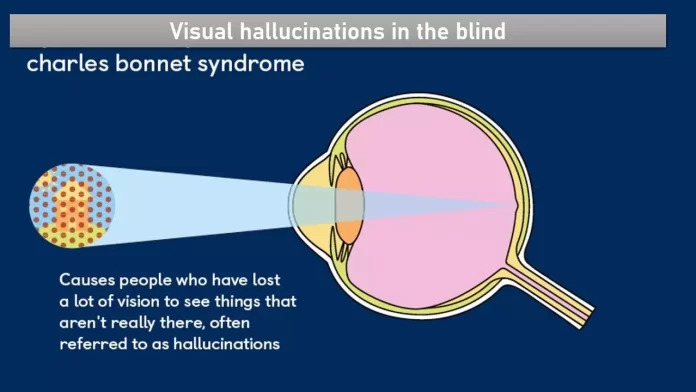Charles Bonnet Syndrome (CBS) is a condition where people with significant vision loss experience visual hallucinations. These hallucinations can be simple patterns or complex images. Importantly, the hallucinations are purely visual and do not involve other senses.
Symptoms
- Visual Hallucinations:
- Simple: Lights, shapes, lines, or geometric patterns.
- Complex: Detailed images of people, animals, landscapes, or objects.
- Awareness:
- People with CBS usually recognize that the hallucinations are not real.
- No Involvement of Other Senses:
- The hallucinations are purely visual, with no auditory, tactile, or other sensory components.
Causes
- Vision Loss:
- Conditions like macular degeneration, glaucoma, diabetic retinopathy, cataracts, or any other cause of significant vision impairment can lead to CBS.
- Brain’s Response to Decreased Visual Input:
- The brain, lacking normal visual stimuli due to impaired vision, generates its own images, leading to hallucinations.
Treatment
- Addressing Vision Loss:
- Improving the underlying vision issues as much as possible through medical or surgical treatments.
- Environmental Adjustments:
- Enhancing lighting, reducing periods of inactivity, and engaging in visually stimulating activities can help reduce hallucinations.
- Reassurance and Education:
- Understanding that the hallucinations are a result of CBS and not a mental illness can help alleviate anxiety and distress.
- Medications:
- In some cases, medications such as antipsychotics, anticonvulsants, or antidepressants may be prescribed, but they are not always effective.
Prevention
- Regular Eye Examinations:
- Early detection and treatment of eye conditions that could lead to significant vision loss.
- Maintaining Eye Health:
- Managing chronic conditions like diabetes, hypertension, and other systemic diseases that can affect vision.
- Healthy Lifestyle:
- Following a diet rich in nutrients essential for eye health, such as vitamins A, C, E, and omega-3 fatty acids, and avoiding smoking.
While CBS cannot always be prevented, early intervention and treatment of eye conditions can minimize the risk of developing this syndrome. Understanding and awareness are crucial in managing the condition and improving the quality of life for those affected.

































